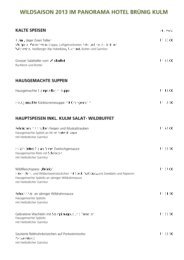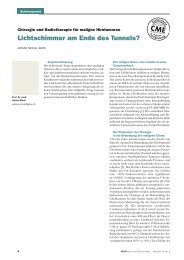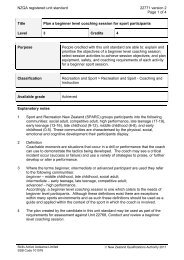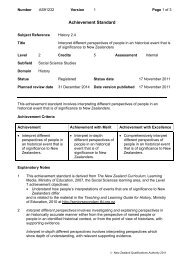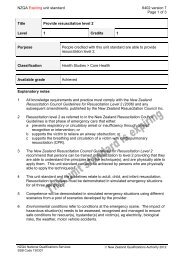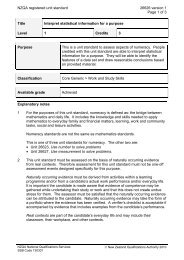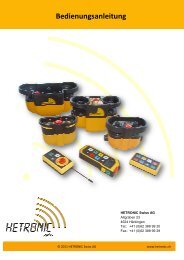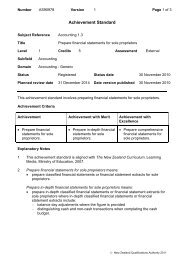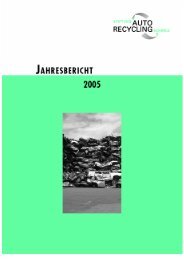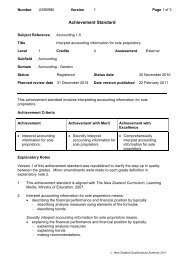91095 Demonstrate knowledge of two music works from ... - NZQA
91095 Demonstrate knowledge of two music works from ... - NZQA
91095 Demonstrate knowledge of two music works from ... - NZQA
You also want an ePaper? Increase the reach of your titles
YUMPU automatically turns print PDFs into web optimized ePapers that Google loves.
Number AS<strong>91095</strong> Version 1 Page 2 <strong>of</strong> 2<br />
Contrasting contexts refer to the:<br />
• historical, social and/or cultural contexts in which the work was composed and/or<br />
performed eg medieval, renaissance, baroque, classical, romantic, twentieth or<br />
twenty-first century ‘art’ <strong>music</strong>, popular, rock, jazz, <strong>music</strong>al theatre, <strong>music</strong> for film,<br />
<strong>music</strong> <strong>of</strong> the tangata whenua (traditional), <strong>music</strong> <strong>of</strong> other cultures<br />
• composer(s) and/or performer(s) associated with the <strong>works</strong><br />
• purpose and/or function (eg commissioned <strong>works</strong>, film <strong>music</strong>, whakapapa<br />
(genealogical narrative)).<br />
3 Musical elements and features refer to:<br />
• elements (eg timbre, texture, form)<br />
• compositional devices (eg motif, riff, repetition, sequence)<br />
• performance practices (eg articulation, call and response, improvisation)<br />
• sound production technologies (eg delay, EQ, sound properties <strong>of</strong> acoustic<br />
instruments/taonga pūoro)<br />
• notation/transmission conventions (eg graphic score, figured bass, jazz/rock<br />
chord symbols, oral narrative).<br />
The score <strong>of</strong> at least one work must be analysed. Score refers to a conventionally<br />
notated score, lead sheet, TAB, or graphic notation.<br />
4 Evidence for assessment may take one or more <strong>of</strong> the following forms – written,<br />
static display, PowerPoint, seminar, annotated scores.<br />
5 Traditional forms <strong>of</strong> Māori <strong>music</strong> may be used for assessment against this standard.<br />
6 The assessment criteria must be applied to provide an overall judgment based on the<br />
weight <strong>of</strong> evidence across the study <strong>of</strong> both <strong>music</strong> <strong>works</strong>.<br />
7 Conditions <strong>of</strong> Assessment related to this achievement standard can be found at<br />
www.tki.org.nz/e/community/ncea/conditions-assessment.php.<br />
Replacement Information<br />
This achievement standard replaced unit standard 10660 and AS90017.<br />
Quality Assurance<br />
1 Providers and Industry Training Organisations must be accredited by <strong>NZQA</strong> before<br />
they can register credits <strong>from</strong> assessment against achievement standards.<br />
2 Accredited providers and Industry Training Organisations assessing against<br />
achievement standards must engage with the moderation system that applies to<br />
those achievement standards.<br />
Accreditation and Moderation Action Plan (AMAP) reference 0233<br />
© New Zealand Qualifications Authority 2011



